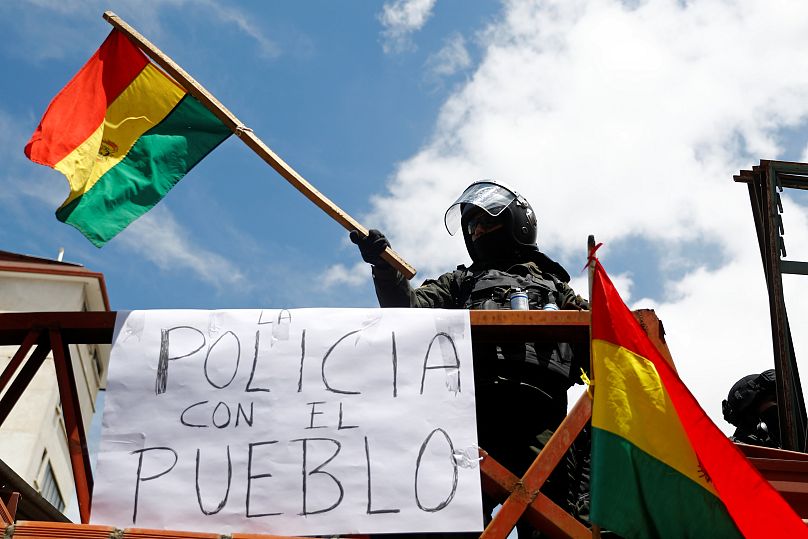The president of Bolivia, Evo Morales, confirmed that he resigns from the presidency after almost 14 years in power.
Evo Morales resigned on Sunday after Bolivia's military suggested that he should leave to help ensure stability in the country.
"After analysing the internal conflict situation, we ask the President of the State to renounce his presidential mandate, allowing for peace to be restored and the maintenance of stability for the good of Bolivia," the commander of the country's armed forces, Williams Kaliman, told reporters.
After three weeks of protests, Bolivia will once again hold elections and its result could trigger major changes in the South American country.
The Organisation of American States (OAS) found irregularities in a disputed vote held last month and the Bolivian President Evo Morales said on Sunday that he would call for new elections. Morales also announced that he would replace the members on the electoral board.
Bolivian President Evo Morales won the elections on October 20, thus renewing his fourth term in office. However, rumours of electoral fraud tarnished the leftist leader's controversial victory.
The country has experienced 18 days of intense protests that culminated this week with police mutinies in some of the country's main cites: La Paz, Cochabamba, Tarija, Sucre and Santa Cruz.
In La Paz, the police read a manifesto in front of the Government's headquarters: "The police are not due to any political party, that is why they join the struggle of the people".
The Bolivian Armed Forces said it had ordered air and land operations to "neutralise" armed groups that act outside the laws, in a statement released on Sunday.
Mexican Foreign Minister Marcelo Ebrard said on Sunday that the country would offer asylum to embattled Bolivian President Evo Morales if he sought it, saying on Twitter that Mexico has received 20 Bolivian officials and lawmakers at its residence in La Paz.
Mexican President Andres Manuel Lopez Obrador wrote on Twitter that the country “recognised the responsible attitude of the president of Bolivia, Evo Morales, who preferred to resign rather than to expose his people to violence.”
'Clear manipulations'
The preliminary OAS report, following an audit of the October 20 vote, said that the international body could not verify the result after it found "clear manipulations".
"The manipulations to the computer system are of such magnitude that they must be deeply investigated by the Bolivian State to get to the bottom of and assign responsibility in this serious case," the report said.
The OAS said it was not statistically likely that Morales had secured the 10 percentage point margin of victory needed to win outright and recommended Bolivia use new electoral authorities for any new vote.
Morales was declared the winner of the October election with a lead of just over 10 points over his rival Carlos Mesa, giving him an outright win. But there have been widespread protests since against the result after a near 24-hour halt in the count.
Morales, who came to power in 2006 as Bolivia’s first indigenous leader, has defended his election win and has said he would adhere to the findings of the OAS audit. He was expected to give a press conference on Sunday morning.
Mexican President Andres Manuel Lopez Obrador on Sunday praised Morales' decision to call for new elections, calling it a "triumph of democracy."
"There are always attitudes, there is an authoritarian eagerness to want to resolve things with confrontation, with violence," Lopez Obrador said in a video posted to his Twitter page. "The best method to resolve differences is the democratic one."
An election without Morales?
Marcelo Arequipa, an expert in political science, told Euronews that it is very likely that Morales will not run in what would be his fifth election. "I don't think Evo will be encouraged to run for another election, he's lost a lot of support in the last few weeks", Arequipa said.
Mesa said on Sunday that Morales should not be a candidate in new elections.
In his announcement, Morales mentioned that the next election will include "new political actors". According to this statement, Morales could be leaving an open door for a new candidate to stand for 'Movement for Socialism', the current ruling party.












